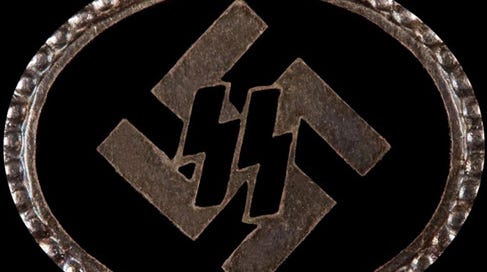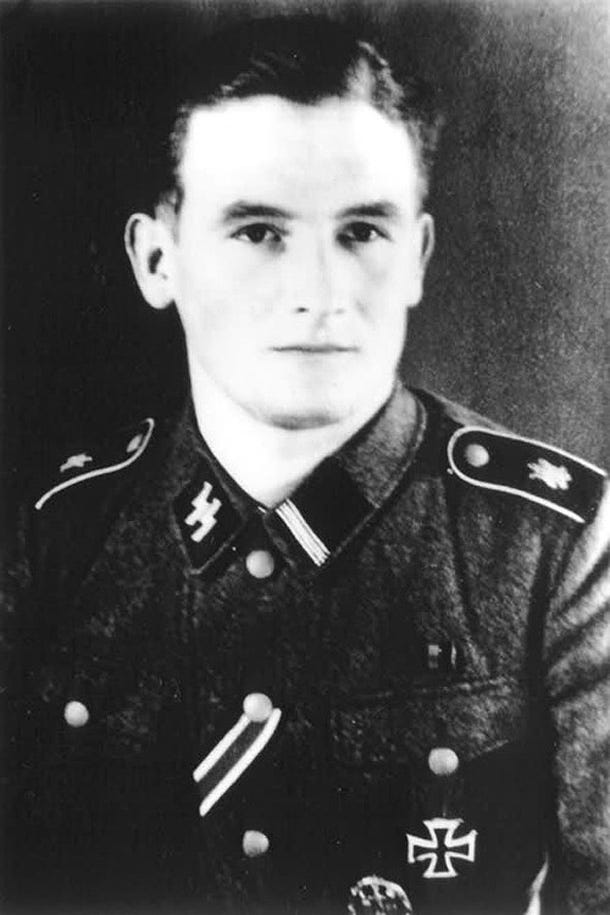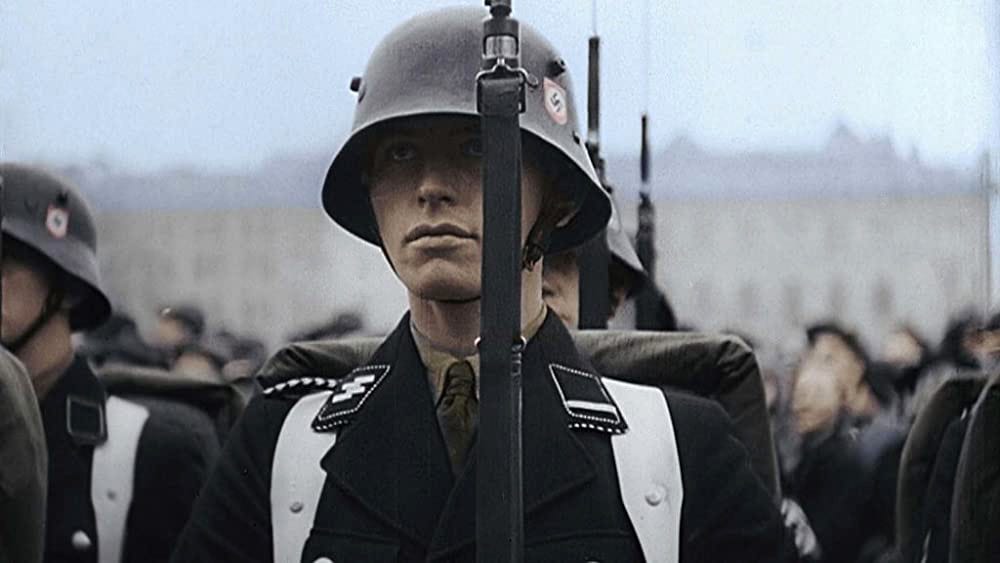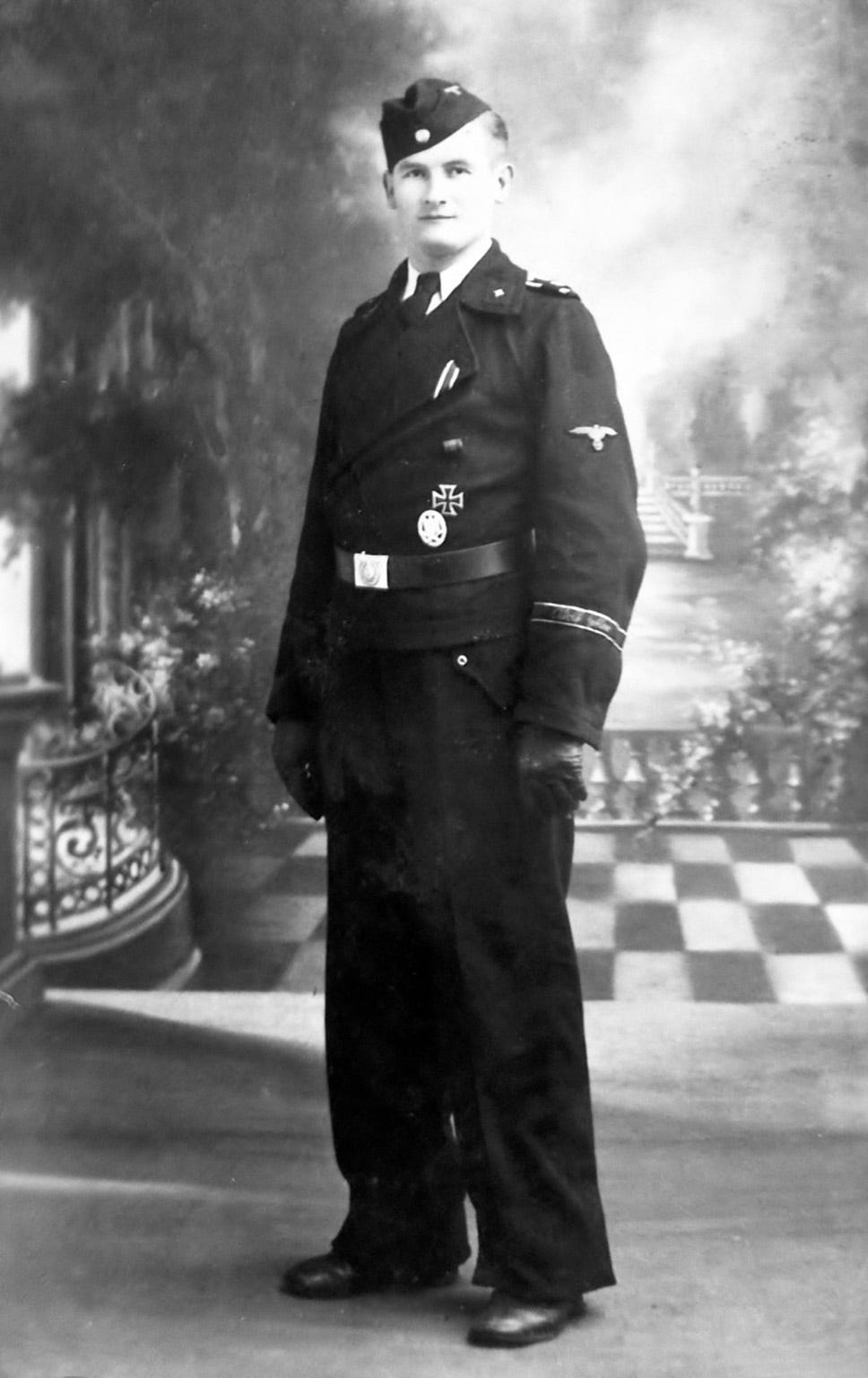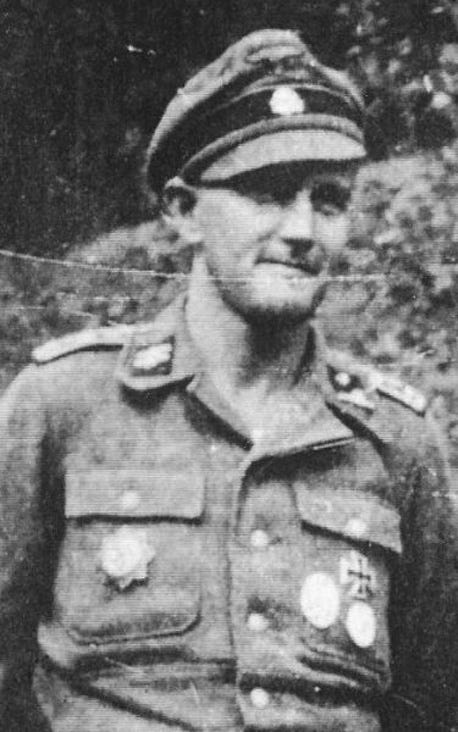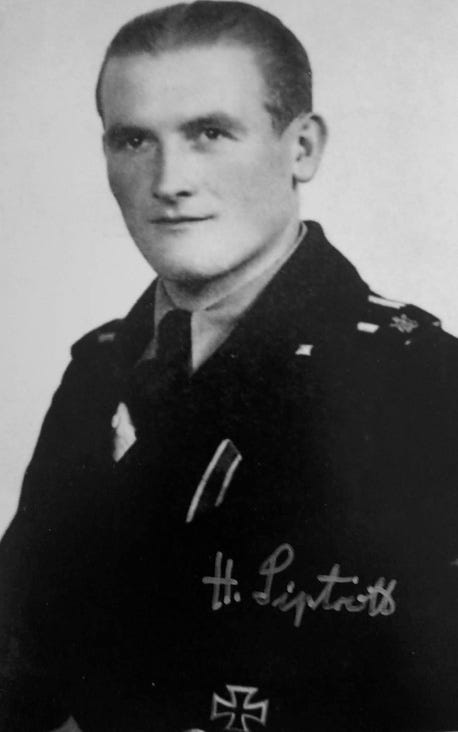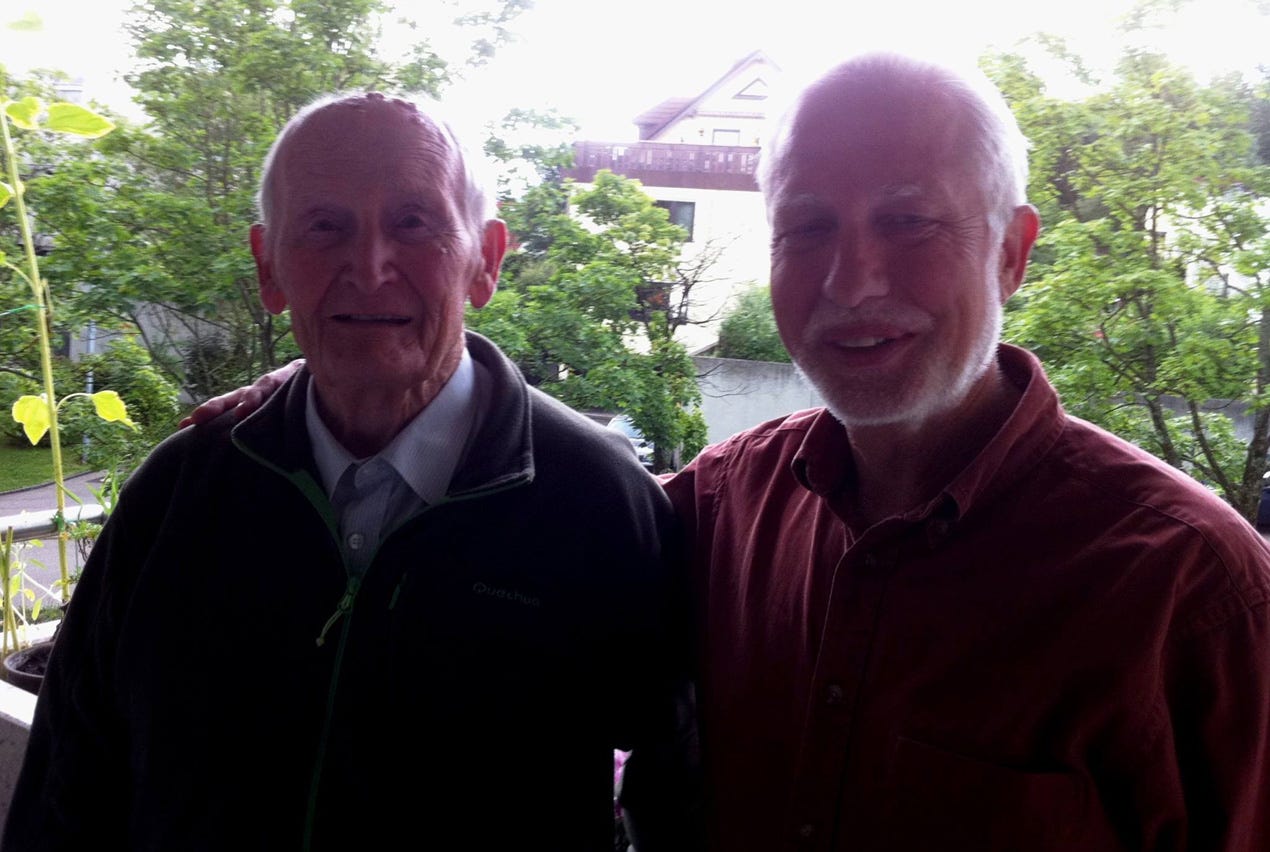Interview with German Cross in Gold winner Hans Siptrott, Tank Commander of the 1. SS-Panzer Division 'Leibstandarte SS-Adolf Hitler', Germany, 1988
I appreciate you meeting with me; I would like to start by asking what attracted you to join the SS?
Hans: I joined because the Leibstandarte was the guard of the Führer, and it carried with it a mystical symbolism linking Germany's past to the present. I wanted to be a part of something great and meaningful, a career that stood out and was respected. In the SS I found what I wanted, a union of men who would form strong bonds of friendship and loyalty. I passed the strenuous background test and exams, which included panel questions relating to National Socialist history, ideas and German culture. The moment I was awarded my service dagger was a proud moment for me, I was formally accepted into a very elite and special group. Many men applied, but very few were selected, it is no exaggeration that sometimes acceptance came down to who had a cavity or not. Every SS man was strong, well built, healthy, and had true German blood going back hundreds of years.
Did you ever meet Sepp Dietrich or the Reichsführer-SS Himmler; what was your impression?
Hans: Yes, the main barracks of the LAH were in Lichterfelde and both men were common sights there. Sepp Dietrich was our commander and often would be seen speaking to us and meeting with his men. Himmler would come by for dinners, speeches, or special events. They both impressed me. Something common in the SS was that there was no class distinction, we had officers, but they were like us. They did not lord over us, treat us unfairly, or insult our backgrounds. Himmler took the time to meet each man in the LAH, regardless of rank, and made sure there were no wants or problems. We received gifts during Christmas, and he encouraged dances and parties to be held quite often. It was a very privileged affair for young women to be invited to a dance party; they would go buy the best dress and heels to match. We would look smart in our black uniforms. Not enough can be said of Sepp, he was the father of our division, and his leadership during the war was exemplary. He was a soldier's soldier. When we were fighting, he was always with us, in a Panzer, armored vehicle, or staff car. When we would bring in prisoners, he sometimes would meet them and speak to them for a while. He was a brave warrior who led from the front. He once told me to lead my men as if I would lead my family, with love, honor, and discipline.
How was the news of the Polish war received?
Hans: Ah, the Poles. Much of what is written about this time is written by the winning side and is their version, not ours. Germany wanted a return of lands taken by Versailles, and war came as a result. Something history forgets is that some Poles wanted a war with Germany, and actively sought to make it happen. They had big heads as they had defeated a much larger Red Army earlier and held more territory than the Allies originally gave them. Isolated bands of Polish criminals crossed our border to steal and it has been reported they sabotaged Reich property. Germany did nothing to provoke these crossings, and some Germans were even attacked. The greatest reason Germany went to war was the treatment of Germans inside Poland. Many were expelled and forced to give up property and belongings. Others had been assaulted and even killed for the reason of being German and refusing to become Polish.
When the Führer spoke to the Reichstag and said we were now shooting back, we applauded this as most Germans were aware of what was going on in Poland. While most of the world's press was silent, claiming the German minority had it coming and agitated against Poland. When the border was crossed, all along the front, the soldiers were welcomed as liberators. No one was upset we set foot into Poland, except the Poles who supported their government's aim of more territory. I met Poles who welcomed us with food and drink. They remembered how good it was under German rule. Some saboteurs and criminals were caught and after a trial they were shot, it is true, but these were legal reprisals for acts against civilians, or fighting out of uniform as civilians.
[Above: The SS were the world's elite. No one else compared. Mankind's highest and loftiest ideals personified in flesh.]
You mentioned you joined the Panzer regiment of the LSSAH and fought at Kursk, what was the battle like?
Hans: Yes, more and more people are interested in this battle; I saw it firsthand from my sector. I was in a Panzer IV with a long barrel, number 705. When we were moved into our staging area, we were all full of hope that this was the final battle to break the Russians and open the front for an offensive again. We had no idea the Russians knew about this through traitors in the high command. Thinking back, it would have been impossible for them to not know something was up; they had a better air force now and flew over us regularly. We had to go to lengths to hide and protect our armor. I can remember that when we started off, our Stukas and artillery had bombed the front pretty well, but the Russians quickly made repairs; we faced stiff resistance from day one. It was a messy battle, we had to attack through woods and they had mines everywhere, even strung in the trees. A German phrase of many enemies means more honor came to mind, as we had a very high kill tally. We knocked out machine gun pillboxes, Pak [anti-tank gun] fronts, and flame [thrower] nests. Even though we took losses, we destroyed the enemy on a grand scale; I never really saw them retreat, and we over-ran them very fast. As we advanced, we hit ring after ring of Pak guns, then the Russians hit us with T-34 tanks in mass.
The Panzer regiment of the LAH had very good commanders, who rose to fame, [Rudolf von] Ribbentrop, [Michael] Wittmann, [Joachim] Peiper, and [Franz] Staudegger. When the tank battle happened, we not only had to fight tanks, but Pak, and infantry. The infantry could easily knock us out if they got close enough and landed a mine in the right place. We respected the T-34 but did not fear it, our Panzer IVs were built to take it on, and did so easily. I found the Russians lacking in skill and training; they would drive right at us with no plan of engagement, just find and destroy. They copied their gun from a Krupp design we gave them early on. If they hit us, they could knock us out, but they had bad aim and missed most of the time. We on the other hand, had better sights and better gunners. We could engage at long range and score hits. Our Panzer 705 was hit by Pak fire and we had to bail out, running from Russian fire as the Panzer burned. I was quickly back in action in another Panzer, this time 738, if I remember correctly. We had to contend with Russian artillery and air attacks, our flak was constantly engaged. It seemed like every artillery piece in Russia was at Kursk, they peppered us with every caliber imaginable.
Many historians favor the Russians, making it seem like they were the underdog and weak, but this is wrong. We were beating them, and pushing through their rings, the kill ratio was vastly in our favor. We had a plan to entrap the whole army and destroy it, by a classic encircling movement. We were vastly outnumbered in terms of Panzers, yet destroyed the Russians on a massive scale. Kursk for me is the battle we could have won and changed the outcome of the war in the east. It is hard for me to describe to you the countless knocked out Russian tanks, if we had not been pulled out, we would have surrounded the 5th Guards and continued to link up with other units. We were the Führer's pride, and he needed us to help Mussolini, who I believe cost Germany the war. Our losses at Kursk were not bad; we did not have that many Panzers. However, what we lacked in numbers we made up for in quality. Someday the unit records will be released and you will see I am telling the truth. The SS units engaged at Kursk were winning the day, and we had forced the Russians to commit all their reserves while we still had some. Every German veteran there agrees, we were on the verge of smashing the enemy but the Führer was talked into making a bad mistake. We were pulled out right when we had the Guard's Army where we wanted them, and the LAH with 'Totenkopf' was prepared for the final push which would have cleared the way for the south wing.
I know the LAH has been accused of war crimes on the Eastern Front, are these claims deserved?
Hans: No, this was a tough war that was fought along ideological lines. We were fighting to destroy communism and rid the world of this plague, this plague fought back using the Russian people as fodder. Most all German units had to deal with partisans and insurrection led by the communists and in some cases the western allies. This was against the rules of war, and when these people were caught, they were tried and many times hung or shot, if it was warranted. My division has been singled out due to bearing the Führer's name; we were accused of crimes on every front, mostly killing civilians or POWs, we did neither. Unfortunately, after the war, due to the methods of questioning, many former soldiers broke down due to tricky tactics or threats and admitted to these. On every front I fought on we treated the civilians with respect and tried our best to keep them safe. Sadly, war on this scale involved civilians on the front lines, so deaths could be hard to prevent. The communist partisans would kill anyone giving us aid and shelter, which is one reason we were harsh when we captured any. They were killers and sadists who would kill regardless of age and were especially cruel to women; I saw this first-hand and will never forget it. Therefore, when you ask what I saw regarding criminal SS actions, I say there was none. Anything we did was in reprisal to these monsters whom are the darlings of the press today, and get to write what is in history books.
[Above: Hans Siptrott in Panzer garb.]
This brings me to the main question I want to ask. It has been written that the LAH murdered 84 US soldiers in Malmedy, during the Ardennes Offensive. Can you tell me what you remember, and if the American version is correct?
Hans: Oh boy, that is a big one. I want to state that many things are not true regarding this battle, and indeed the whole war. A claim was made against the SS that we never took prisoners or had orders to kill prisoners. This was never true, and even though we detested the conduct of the Allies, we would not stoop that low. The vast amount of American POWs we took during battle is testament that we had no orders to kill prisoners and would have refused that order without justification. I want to state also that it is illegal in West Germany to defend the Waffen-SS and attack the Allied version of events. Anyone doing so risks losing any pension or aid we receive, plus the threat of going to jail. I have had writers seek me out, due to my testimony to the court regarding what I saw. I will tell you what I remember; some of it seems like yesterday, it was a confusing situation that even Germans who were there did not agree on. We launched our attack against the American lines, and I was in the Panzer regiment of the LAH under Peiper still. He was a very hard commander; some comrades even accused him of being reckless. He was tough and had no room for mistakes or laziness. Our orders were to drive forward to a town to capture American officers and supplies. We broke through the lines quite easily and were on schedule.
The advance point of our regiment came to Baugnez [in the municipality of Malmedy] and stopped; they were scouting the area, the same time as the Americans were arriving. They opened fire, starting a battle, and then our Panzers arrived and broke all resistance. The Americans ran away, hiding where they could. This is when I arrived and was ordered to the side to help guard the men being captured. I did not count how many there were, but more arrived, as another battle erupted with even more arriving American soldiers. I noticed the Americans acted in an undisciplined manor, this was a mixed group apparently with no command structure, so the men did what they thought was rational in their minds. German soldiers were out still trying to track down the men who ran away. I angrily watched all this unfold, I wanted to get back with my column and was not happy about being stopped. The Americans only had a few weapons turned on them, so some took this as an opportunity to escape and re-arm themselves. This is what caused the shooting. I saw American soldiers moving back and forth and talking to each other. They seemed to be moving close together to hide what was happening behind them. We knew some already ran away, and we were watchful that more units were not coming up where they could attack us. To me this showed the American cowboy spirit, to be defiant and lawless.
I was looking down my hatch, speaking to my gunner about how unorganized this all was, when I heard machine gun fire from newly arriving units, and at the same time my loader fired a pistol. He had stated he saw three Americans getting away, and one of the guards raised his weapon to fire at them, so he assumed this was an escape attempt. The newly arriving unit did not know what was going on; they opened fire too, striking the soldiers, as they assumed this was a fight. There also had been soldiers hiding in buildings, which our men had to clear. In one, they refused commands to come out, so they were burned out, then took off running, being shot down when seen. I did not see this personally, so I am repeating what I heard. My point is that no war crime took place, we did not purposely kill unarmed American soldiers, and this was more of a reckless reaction due to the reckless actions of some prisoners. The Americans caused this incident to happen, by not having a chain of command who reined them in and force them to stand fast. They even admit they had men escape, there were 20 or so I believe that successfully ran away, and our officers failed to gain control of the situation, as it was somewhat an active battle still.
Something I honestly did not see, but was forced to admit, is that some of our men shot the wounded. This is problematic, as we treated all wounded, even on the Russian Front, and would never deny care to an enemy unless there were extra circumstances. This may have been one of those times, if it indeed happened. Two comrades claim it did and testified to this, saying men shot wounded systematically. We had orders from Peiper to keep moving and get to the objective quickly. After this happened, we received angry shouts to get moving. A common trick of all soldiers is to play dead, and then rise up and continue the fight. We had no medical personnel close by, no medicine to help with pain, and had to get going. If these soldiers did this, I am sure it was with the intention to prevent an attack and to put badly wounded out of suffering. This is assuming it actually happened, as other comrades say they were lying to save their skin. It is unfortunate that many former soldiers agreed with the winners so they could fit in after the war. Something I want you to know is that the Americans put out an order to not take any SS man or Fallschirmjäger [paratrooper] prisoner, resulting in many dead. Even before this, in Normandy, Africa, Sicily, and Italy, they killed German wounded and prisoners. This was seen first-hand by many who reported it back to their officers. We never did this and took prisoners when we had the chance. Our honor would never let us act like bandits and murderers. One might argue we were actually too nice to our enemies and they used it against us.
Do you believe the SS committed any war crimes at all?
Hans: No, I must honestly tell you that from experiences on all fronts, I only saw crimes committed by our enemies. The trials held after the war certainly were compelling and presented much evidence against the SS, with some comrades testifying they saw crimes committed, but I suggest the Allies coerced these statements. You should do more research into how these confessions were extracted, and how witnesses were identified and coached. Many claims come from the Soviet bloc, so their word is not debatable. Those charged in the Malmedy incident were harassed, beaten, tortured, and threatened so much that our sentences were greatly reduced and we were all released. This was all due to the uncovering of the illegal tactics by the American team who had a great many Jews on its staff that used every opportunity to harass and torture us. I even wanted to escape as I thought any day I would be hung, and they even went so low as to seduce the wives of comrades and show photos; a few men supposedly hung themselves due to this. This was appalling and disgusting, only the lowest form of life could conceive it.
Most all war crimes trials had the same result, trumped up evidence, torture, and coerced confessions resulted in convictions being overturned for just about all defendants. You also must not confuse legal wartime reprisals with war crimes. There were times when German units fought illegal guerrilla fighters who inflicted death and severe wounding on soldier and civilian alike. When they were caught, they went before a court and were sentenced according to the crime. Many went to camps, others to the rope. I saw one case in Italy where the communists went into a pro-Mussolini town, and hung civilians who had aided our men in a staircase. They were a vile mix of animals who delighted in punishing people in the most bestial manner, then turned and pointed the finger at us, saying that we did this. One day the world will know the truth, which is my conviction.
[Above: Hans Siptrott, on the left picture you can see he is wearing the German Cross in Gold.]
[Above: Hans Siptrott (left).]
Found at http://www.mourningtheancient.com/index1.htm

